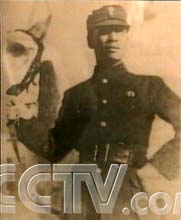 On Aug. 13, 1937, the Japanese army attacked Shanghai and the battle between China and Japan thereafter lasted more than three months, which was called historically “August 13 Incident”. On Oct. 25, 1937, Japanese forces occupied Shanghai. On Aug. 13, 1937, the Japanese army attacked Shanghai and the battle between China and Japan thereafter lasted more than three months, which was called historically “August 13 Incident”. On Oct. 25, 1937, Japanese forces occupied Shanghai.
The Colonel Xie mentioned in the theme of the film “Eight Hundred Heroes” is Xie Jinyuan. The story of him and his 800 followers in the Anti-Japanese War of 1932 in Shanghai was spread all over the country via this song.
On November 27, 1937, the first day that Shanghai fell, the citizens found that there was a Chinese army fighting bravely on the roof of the Sihang warehouse. Hearing the news, people assembled voluntarily at the south bank of the Suzhou River to boost their spirit.
One day later, the main force of Chinese army retreated from Shanghai ending up the 75 days of hard fighting against enemies. The aggressive enemy tanks were driven into this ever-prosperous metropolis.
People in the enemy-occupied area saw that Chinese guns and bullets were still flying towards the enemy, and the Chinese forces bravely protecting their homes bravely. The “Shen Pao” also described it as: At daybreak, people passing by on the other bank all saluted the Chinese army with tears in their eyes.
The army besieged by tens of thousands of Japanese army was called “eight hundred heroes”.
In June of 1937, the Japanese invaders started the Lugouqiao Incident in Beiping (today’s Beijing) marking the beginning of their invasion. In August, they started the Rainbow Bridge Airplane Incident in Shanghai and as an excuse, they reinforced dozens of naval ships and over 3,000 marine corps to Shanghai. On August 13, the Anti-Japanese War broke out.
Five years earlier, Xie Jinyuan took part in the “January 28 Hu Incident”. Five years later, his army set off the first shot of the “August 13 Songhu Incident”. This time, Japanese forces had fourteen and half divisions with almost 300 thousand soldiers including half of the Japanese navy. The destruction of the enemy’s naval ships, especially the Chuyun ship, was the main target of Chinese army. Xie Jinyuan, the Lieutenant Colonel Administer put forward a plan to surprisingly attack the enemy ship by using a speed boat carrying a special detonator. Although they failed to shoot at the Chuyun ship, they destroyed the enemy dock and their facilities, forcing the Japanese forces to retreat eastwards and the Huangpu River was silent thereafter.
The chief of staff of the 88th division, Zhang Baiting wrote in a memorial, “people all respect Colonel Xie Jinyuan as a lionhearted hero but he is also a genius with resourcefulness and high culture.”
The “August 13 Songhu Encounter” was the biggest battle after Japan-Russia war in far east military history. It was also the first large-scale engagement in the Anti-Japanese War. Japanese forces pre-declared to occupy Shanghai in three days and conquer China in three months. Almost 300,000 Japanese soldiers and hundreds of thousands of Chinese forces went into battle.
On October 26, 1937, the Dachang defence line was broken through forcing tens of thousands of Chinese forces to retreat. Meanwhile, the Japanese occupied Shanghai.
In order to hide their retreat, the highest command decided to leave an army division holding a main position.
More than 60 years has passed, Sihang warehouse still stands beside the Suzhou River silently telling the soul-stirring scene of “Sihang Defending Battle”.
The Sihang warehouse jointly run by four banks and had six stories, which was rarely found in Shanghai then. Its wall was so thick and solid that Japanese canons couldn’t break through them. The warehouse and common concession were separated by wire netting.
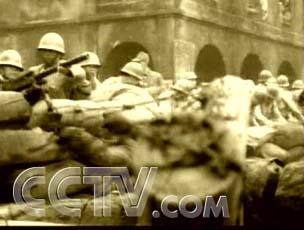 Xie Jinyuan born in Jiaoling, Guangdong was one of the fourth batch of graduates of Whompoa Military Academy. At the age of 33, he was appointed as the Lieutenant Colonel and administer of staff of the 262nd brigade, 88th division. After receiving the order to retreat, before dawn on October 27, Xie Jinyuan led the 1st battalion of 524th regiment to retreat into the Sihang warehouse that was the unique land belonged to Chinese forces at that time. In order to misdirect the enemy, Xie Jinyuan lied to the reporter that they had 800 soldiers there, hence the saying “Eight Hundred Heroes”. Even though they faced well-armed Japanese forces, the 400 Chinese soldiers had no fear. Xie Jinyuan required all staff to stay in the warehouse even if they might be the last one left.
Xie Jinyuan born in Jiaoling, Guangdong was one of the fourth batch of graduates of Whompoa Military Academy. At the age of 33, he was appointed as the Lieutenant Colonel and administer of staff of the 262nd brigade, 88th division. After receiving the order to retreat, before dawn on October 27, Xie Jinyuan led the 1st battalion of 524th regiment to retreat into the Sihang warehouse that was the unique land belonged to Chinese forces at that time. In order to misdirect the enemy, Xie Jinyuan lied to the reporter that they had 800 soldiers there, hence the saying “Eight Hundred Heroes”. Even though they faced well-armed Japanese forces, the 400 Chinese soldiers had no fear. Xie Jinyuan required all staff to stay in the warehouse even if they might be the last one left.
As relevant personnel recalled, before the dawn of October 27, 1937, the army retreated to the warehouse in succession. Xie Jinyuan then began to deploy troops. They blocked all the doors and windows of the ground floor as well as half of those upstairs with sandbags and material in the warehouse, while the rest of the troops kept fighting. Two soldiers watched one window from day to night so that it was possible to fight against the enemy at any time. The scatterguns were set at the 2nd floor for outpost.
Wen Qiang, the pre section chief of Shanghai branch of secret agency of military commission of Kuomintang, recalled, “Xie Jinyuan and I talked as we walked. We inspected the warehouse. Wherever we went, all I saw was orderly and clean barracks. All that I heard was boiling patriotic songs which moved and inspired me.”
On the third day, Xie Jinyuan wrote to the division commander, Sun Yuanliang showing their determination to fight to the end. He and the “eight hundred heroes” made will previously, “To fight the enemy to the end even with only one gun and one shot left, punish the enemy even with only one drop of blood left.”
The head of the 1st battalion, Yang Weifu wrote, “The Japanese army lighted the Tibet road up with searchlights and blanketed the crossing with machine-guns. At about 10 o’clock, their firepower became even more intensified with flat fire guns and trench mortars bombing once per second at the battle’s height.”
The isolated army’s spirit greatly infected common people, foreigners and foreign armies in the concession. They were organized themselves to donate great amounts of food and medicine. The world opinion also showed its sympathy and high praise to them. A foreigner wrote to “The Times” by the name of worshipper praising the eight hundred heroes as fighting for the honor of the Chinese soldiers, for a country’s dominion, for a nation’s survival, for humanity, for civilization and for peace.
The Chief Commander of the British army in common concession, Smoley said, “We are all soldiers with experience from the European War, but I haven’t seen any army more brave or heroic than the Chinese defending Zhabei.”
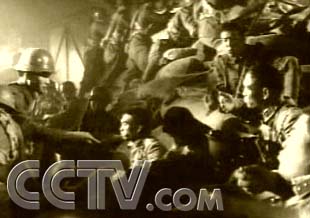 The story of the “eight hundred heroes” aroused great reaction in the nation. Madam He Xiangning stood on the south bank of the Suzhou River watching to show her respect. Moved to weep by their heroic spirit, she said, “Each one of you have a revolutionary and sacrificial spirit. Because of you, the martyrs will become even greater, the soldiers at front-line will fight more bravely, the Chinese people will become united and people in the world will become more just.”
The story of the “eight hundred heroes” aroused great reaction in the nation. Madam He Xiangning stood on the south bank of the Suzhou River watching to show her respect. Moved to weep by their heroic spirit, she said, “Each one of you have a revolutionary and sacrificial spirit. Because of you, the martyrs will become even greater, the soldiers at front-line will fight more bravely, the Chinese people will become united and people in the world will become more just.”
The division commander, Sun Yuanliang wrote to Xie Jinyuan, “You can obey the order and hold fast to your position pledging to stay in Zhabei. Your justice and braveness have my and Chinese army’s highly respect. What you have done is the great achievement in history. All the Chinese descendants as well as others in the world will read it in history with great respect and sincerity.”
The common people’s patriotic passions encouraged the “eight hundred heroes” further. In the morning of the 28th, Xie Jinyuan snipped in person. On the same day, the defending troop held off the enemy several times. When the enemy’s land troop attacked the gate with a tank planning to fire at the warehouse, the soldier, Chen Shusheng lit the fuse of the grenades tied on his body, jumped out from the sixth floor and perished together with the enemy.
In world military history, such a scene was rarely found: every morning, people in the concession climbed on roofs of building watch the fighting without concern about shots flying. When they found the enemy, they would shout to the isolated army. Some even drew the enemy’s moves on a big blackboard with big characters.
During the four days and nights that the “eight hundred heroes” held the Sihang warehouse, people came here to watch the fight every day even up to tens of thousands of people.
They kept fighting while building the defense barrier at the same time, on October 30, the highest command ordered them to retreat to the common concession.
The order made Xie Jinyuan surprised and distressed. The defence work was steady and a more efficient way to hold down and attack the enemy, to support the main forces. But retreating to the concession meant hurling themselves willingly into the net. He indicated several times that all staff determined to hold to the bitter end and ask to help them fulfill there wishes.
On the 30th, the repeatedly defeated enemy began to bomb at the warehouse fiercely, mostly with one bomb per second. Besides, they poured and fired the gas around the warehouse. Blind to the international regulation, Japanese forces set off poison gas hurting dozens of Chinese soldiers.
Japanese forces threatened that nothing would stop them from using extreme means on Chinese army.
On the night of October 30 1937, Xie Jinyuan got the retreat order from the high command repeatedly. He had no other choice but to retreat.
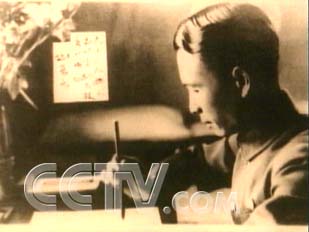 After mid night, during the enemy’s shooting broke, the Chinese army retreated orderly into the concession through the Tibet road covered by the machineguns. The “eight hundred heroes” fought against tens of thousands of Japanese army in a tiny area for four days and nights with 200 enemies killed down achieving success militarily, politically and morally.
After mid night, during the enemy’s shooting broke, the Chinese army retreated orderly into the concession through the Tibet road covered by the machineguns. The “eight hundred heroes” fought against tens of thousands of Japanese army in a tiny area for four days and nights with 200 enemies killed down achieving success militarily, politically and morally.
The British army promised to help them retreat and rejoin the main force. But when they entered the concession, the British army forced them to put down their weapons. Meanwhile, the Kuomintang government ordered them to cooperate with British army and then the unarmed army was carried to Jiaozhou.
That was because the Japanese forces threatened to enter the concession to go after the Chinese army if they tried to rejoin the main forces. Jinyuan lane in Shanghai was named in honor of the Colonel Xie Jinyuan.
After arriving at the Jiaozhou Park, Xie Jinyuan’s army was besieged in one-hectare area by the wire netting and watched over by White Russian soldiers, which was also called isolated army barrack.
Beginning on the first day of 1938, Xie Jinyuan began to a journal dairy about the production, life and training of the isolated army as well as his homesickness, worries about China, analysis of the international situation and thoughts on his and the isolated army’s future.
Even living in these bad conditions, the soldiers kept their morale. Without weapons, they did barehanded training and held sports matches. Colonel Xie was the drillmaster.
There was a timetable for work and rest recorded clearly in Xie Jinyuan’s dairy: in the morning, 4:30, get up; 5:00-7:00, morning training; 8:00, check out the number of the army by the White Russian army: 9:00, breakfast time, 10:00-11:30, class time, in the afternoon, 4:00, dinner time; 5:00-7:00, teach the Chinese boxing or songs; 7:30-8:00, free time, at night, 9:00 go to bed without any exception.
In August, 1938, Xie Jinyuan led the army in celebrating the anniversary of the “August 13 Incident”. Threatened by Japanese forces, the bureau of concession forced them to stop. During the encounter, there were four soldiers killed and over 100 injured. Then Xie Jinyuan led his army to fast for several days to protest. Hearing of this, the citizens in Shanghai began to protest and strike as well.
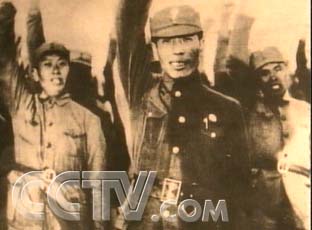 On August 13, the CCP in their Hankou organ publication expressed their sincere sympathy for the “eight hundred heroes”. In terms of that, Xie Jinyuan wrote in his dairy: We are at other people’s mercy like fish or meat on a chopping board. People of a weak nation are despised everywhere. How can we stop fighting and spilling of blood?
On August 13, the CCP in their Hankou organ publication expressed their sincere sympathy for the “eight hundred heroes”. In terms of that, Xie Jinyuan wrote in his dairy: We are at other people’s mercy like fish or meat on a chopping board. People of a weak nation are despised everywhere. How can we stop fighting and spilling of blood?
Besieged by Japanese forces, Shanghai became an isolated island. The plight of the isolated army became much worse. Xie Jinyuan personally led soldiers to attend sports games encouraging them to endure the hardship and waiting for the sunshine’s coming .
He wrote a poem to encourage himself: I have the bravest eight hundred soldiers; but only I can express my feelings in poem. Who cares about our patriotic passions? My resentment of the enemy penetrates down to my marrow.
In the barracks, Xie Jinyuan often released proclamation to encourage the compatriots to fight against Japanese invaders. People in Shanghai respected him very much. Many committees and schools tried to organize people to visit the isolated army. Lots of them came there to find the answer of their bitterness and confusion. As the newspaper reported, “people come and go as if the believers turned to God.”
Imprisonment being prolonged infinitely, along with repeated failures of Chinese forces, sometimes the army was barely supplied with enough basic provision and the barracks were filled with a depressed air. Not long after, a soldier escaped. Then Xie Jinyuan strengthened his control. Both foreigners and natives were very upset about their plight. They proposed many times to transport the isolated army by batch in the name of visiting. But all of their suggestions were rejected by Xie Jinyuan. Until 1941, the isolated army had been imprisoned for three years. From his diary, we know that Xie Jinyuan always suffered from insomnia.
“My mind is filled with rage and pain. Tonight I still can’t sleep. Even if I slept, I would dream of getting a pair of wings and flying like a bird. After waking up, I will worry more about our future.”
One day, a note was found in the bathroom indicating their dissatisfaction with Xie Jinyuan and other officials aroused by the bad meals that the soldiers had, which made Xie Jinyuan more depressed. He wrote in his diary, “I am struggling daily to respond to the situation inside and outside. It’s making me feel isolated and helpless. Looking back the past time, I can’t help bursting into tears.”
Not long after, Xie Jinyuan got the news that his mother was badly ill. As the only son in the family, he missed his mother more and more.
Meanwhile, his mood became worse. He wrote to his family of his will, “The situation in Shanghai has become worse and more dangerous. I am afraid that the concession will not always be a safe place. I got news that the enemy planned to kill me. Real man should be born and die honorably,” he continued, “Even if I was dead, my spirit and name would be a glorious memory. Everyone will be dead. I am glad that I can die like this.”
On April 9, 1941, this brave and unflinching colonel wrote in his diary unbelievably like this, “According to my fortune, I will be murdered between March and September this year. You should be careful as well.” He continued “I haven’t any brothers, and all the sisters are married. Both of my parents are old and if there is some big change in the family, how will they survive?”
After the establishment of the government of Wang Jingwei, Chen Gongbo became the first puppet mayor of Shanghai. He induced Xie Jinyuan to capitulate many times and invited Xie Jinyuan to be the chief of the staff of the No. 1 puppet army. Xie Jinyuan tore the warrant into pieces and shouted at the traitors. He said, “my parents are Chinese and their son also is a Chinese. Chinese are never flunkies.”
On April 24, 1941, when they were doing morning training at 5 that morning, Hao Dingcheng and three other soldiers brought out daggers an iron pickaxe and some other weapons hidden in clothes and ganged up and attacked Xie Jinyuan, stabbing his head and breast. Because of the serious wounds and the blood loss too much, Xie Jinyuan passed away at 6 o’clock at the age of 37. The four murderers were caught on the spot. According to them, they were bought off by the puppet government of Wang Jingwei. As the news spread, more than 100 thousand people came to express their condolences. On May 8, the Chinese government decreed Xie Jinyuan the major general of the infantry posthumously.
Before the Songhu Battle in 1937 broke out, Xie Jinyuan had personally escorted his wife and children back home. He said to his wife, “I am not a good son and husband. You have to support our parents and raise our children at the same time. I will welcome you and our children back personally after achieving victory.” But Xie Jieyuan couldn’t fulfill his promise. When he died, the youngest child among four was only six years old. All his children hadn’t deep impression about their father, but they knew that their father is a hero and one of eight hundred heroes.
|